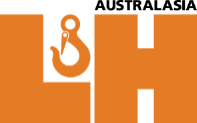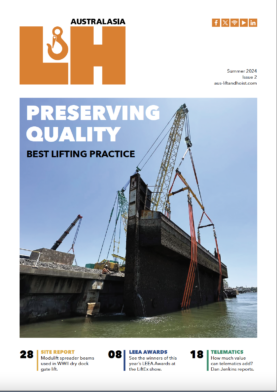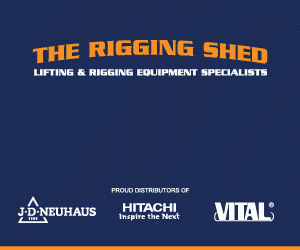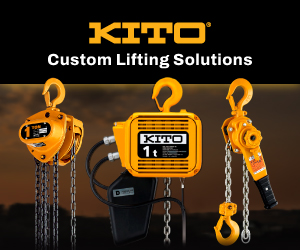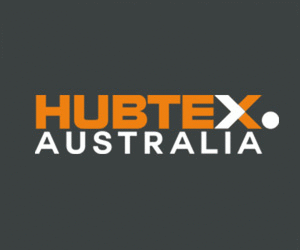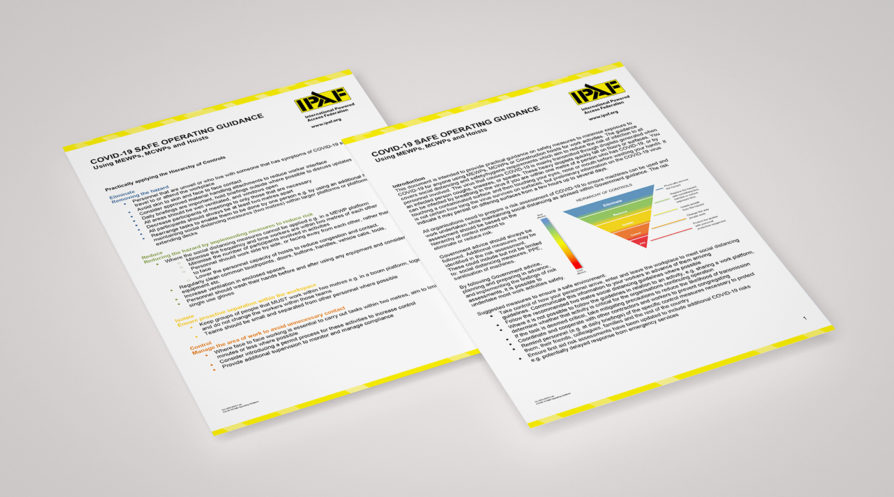)
IPAF guidance helps to minimise COVID-19 risk
The International Powered Access Federation (IPAF) has issued guidance to help those using elevating work platforms (EWPs), mast-climbing working platforms (MCWPs), construction lifts and hoists to work safely and minimise the risk of spreading COVID-19.
The new document has been developed and reviewed by IPAF’s safety experts and members with specialist knowledge of health and safety best practice. It is centred on a hierarchy of risk, with guidance on how to mitigate possible exposure to the virus to help protect employees, colleagues, customers and users of powered access equipment. At all times the latest government advice should be adhered to.
The hierarchy is ranked from eliminating risk entirely, through reducing risk, isolating users from risk and controlling risk to protecting against risk through use of personal protective equipment (PPE).
In addition to the new guidance document, IPAF will publish a free webinar that helps to explain the key principles and measures in more detail. The webinar will be hosted by Health and Safety professional, Chris Wraith, live on 21 May at noon UK time, and will be available to review afterwards. To register for this webinar or view the recording click here.
Peter Douglas, IPAF’s CEO and MD, said, “Ours is an industry founded on the principles of safe working and adopting best practice through sound risk assessment and mitigation. There’s an increased risk at present posed by the spread of coronavirus and we must do everything we can to eliminate, reduce, control or protect against it.
“Powered access equipment is key to conducting work at height safely, the services our members provide are of vital importance on construction sites, maintenance and infrastructure projects around the world. If powered access firms can’t do this work, projects will be hampered and safety while working at height could be compromised.
“Governments and economies are currently looking to ease some of the restrictions imposed to halt the first wave of infections, but we appreciate it will not just be back to ‘business as usual’ while the risk of contracting this virus remains heightened. Therefore, we have issued what we feel is a comprehensive set of guidelines for operating safely in light of this elevated risk, with sensible advice about how to identify risk, maintain social distancing and workplace hygiene, and use of additional PPE.
“While back-office staff may be able to work remotely and IPAF training candidates can take some or all of their course via eLearning, there is guidance for IPAF Training Centres on how to maintain social distancing for those who must attend in person, for instance to complete a practical assessment to obtain or renew a PAL Card.
“On construction sites, enhanced risk assessment, cleansing of machines, use of additional PPE such as face masks and visors, and using extra machines to allow a ‘one operator per platform’ rule to maintain social distancing are all recommended. If contractors need to hire additional machines, it’s important to only ask trained and familiarised operators to use the equipment and for work to be adequately supervised.
“Remember, it is very important not to use the virus as an excuse to cut corners on established principles of work at height safety. It is vital that employees are protected from risks associated with working at height at the same time as being mindful of the additional risk posed by coronavirus.
“Never ask someone who isn’t properly trained to use a MEWP [EWP], MCWP, lift or hoist, and always ensure you have the right machine for the job. These basic principles have not changed. Likewise, powered access equipment should be provided in a safe working condition and subject to correct inspection, maintenance and thorough examination at all times.
“Work should be supervised to ensure best practice is being observed, and it is recommended supervisors or managers should also be trained, for instance using IPAF’s MEWPs for Managers training, which can be conducted wholly via eLearning.
“As an industry powered access is all about safety, so while the challenge facing us should not be underestimated, with proper planning, robust risk assessment and common sense measures to minimise the chance of spreading the virus and protect all employees, this issue can be managed. If you have any queries about this or any other safety and technical matter, please contact your nearest IPAF office or representative.”
To view the new IPAF guidance document click here
